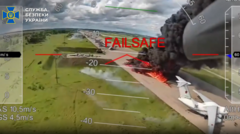American military leaders are increasingly anxious about the consequences of ongoing operations in Yemen, which may affect the United States' ability to respond to threats from China, according to congressional aides.
U.S. Military Faces Resource Strain Amid Yemen Campaign and Chinese Threats

U.S. Military Faces Resource Strain Amid Yemen Campaign and Chinese Threats
Concerns grow over the depletion of U.S. military assets as Yemen operations ramp up, potentially compromising readiness against China.
In a startling revelation, U.S. military officials have expressed serious concerns that the ongoing bombing campaign in Yemen, as ordered by President Trump, could lead to resource shortages critical for countering potential conflicts in Asia. These operations, which began against a backdrop of rising tensions following the Israel-Gaza war in late 2023, have necessitated the deployment of significant U.S. resources, including two aircraft carriers, B-2 stealth bombers, and additional fighter jets to the Middle East.
The ramifications extend beyond the immediate region, with military leaders worried that supplies might need to be redirected from stockpiles in the Asia-Pacific to meet demands in the Middle East. This transfer could weaken U.S. readiness in the Pacific, a region underscored as vital for deterring China.
In light of the escalating demands, American service members stationed in the Middle East are currently operating under intense pressure, described as a "high operating tempo." This high-stress environment not only affects the efficiency of deployments but also poses challenges for maintaining equipment and readiness.
Admiral Samuel Paparo, leading the Pentagon's Indo-Pacific Command, is expected to address these critical readiness issues during his upcoming testimony before Congress on Wednesday and Thursday. His insights are anticipated to shine a light on the broader implications of resource allocation and operational sustainability amid these dual regional crises.





















